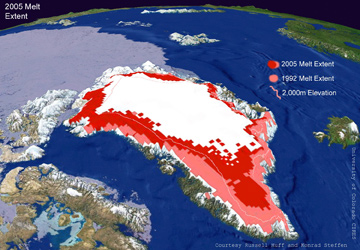Bush aides say mankind responsible for global warming
Bush aides say mankind responsible for global warming
mongabay.com
September 14, 2007
Dr. John Marburger, President George W. Bush’s chief scientific advisor, said it is more than 90 percent certain that greenhouse gas emissions to blame for rising global temperatures, according to BBC News.
In comments shortly before talks on climate change at the UN and the Washington White House, Marburger added that Earth may become “unlivable” without cuts in carbon dioxide emissions, reports the BBC.
“I think there is widespread agreement on certain basics, and one of the most important is that we are producing far more CO2 from fossil fuels than we ought to be,” BBC News quoted Marburger as saying. “And it’s going to lead to trouble unless we can begin to reduce the amount of fossil fuels we are burning and using in our economies.”
“CO2 accumulates in the atmosphere and there’s no end point, it just gets hotter and hotter, and so at some point it becomes unlivable,”
 Melting of the Greenland ice Sheet in 1992 and 2005. Graphic by Konrad Steffen and Russell Huff of the Cooperative Institute for Research in Environmental Sciences (CIRES) at the University of Colorado at Boulder |
Marburger’s apparent support for the findings from the recent UN Intergovernmental Panel on Climate Change (IPCC) is backed by James Connaughton, the chair of the White House Council on Environmental Quality and President Bush’s top advisor on climate. However Connaughton says cutting human-caused emissions will be difficult and will depend on “technological solutions.”
Marburger added that limiting global average temperature increase to the 2-degree C target advocated by the IPCC is arbitrary.
“It’s not clear that we’ll be in a position to predict the future accurately enough to make policy confidently for a long time,” he told BBC News.
“I think 2C is rather arbitrary, and it’s not clear to me that the answer shouldn’t be 3C or more or less. It’s a hunch, a guess.”
While Marburger’s sentiments may be shared by the Bush Administration, many scientists believe it is smarter to err on the side of caution when it comes to CO2 levels since Earth’s climate system is driven by poorly understood, non-linear processes.
In the September 13th issue of the journal Nature, Cambridge University economist Partha Dasgupta writes that significantly higher carbon dioxide concentrations “would involve crossing an unknown number of tipping points… in the global climate system. We have no data on the consequences if Earth were to cross those tipping points. They could be good, or they could be disastrous.”